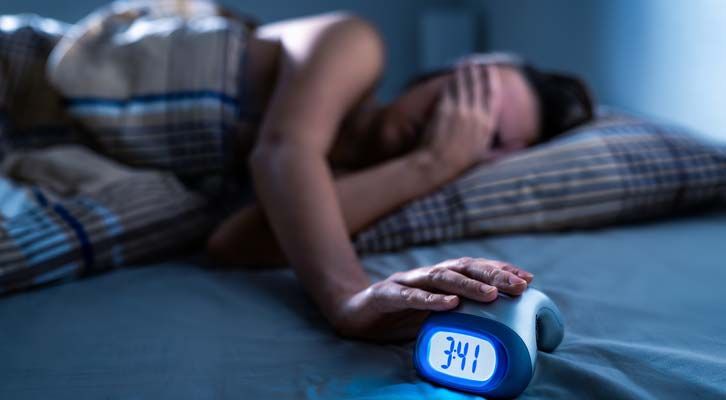Insomnia Treatments NYC by Marc Bystock L.Ac.
Acupuncture for Chronic Insomnia by Marc Bystock NYC Acupuncturist in Midtown Manhattan NY 10016
Hi, I'm Marc Bystock, an experienced acupuncturist based in NYC. If you've been struggling with sleepless nights, fatigue, and a decline in your overall quality of life, I want you to know that I truly understand and empathize with what you're going through. Insomnia can feel isolating and overwhelming, but it doesn't have to control your life. Using a holistic combination of acupuncture and integrative treatments, I can help you uncover the root causes of your sleeplessness and provide a path toward restful nights and rejuvenated days.
-Marc Bystock, NYC Acupuncturist
What is the Medical Definition of Insomnia?
Insomnia is a common but complex sleep disorder that impacts your ability to fall asleep, stay asleep, or wake feeling refreshed. Unlike occasional sleeplessness due to stress or excitement, insomnia is a chronic condition that disrupts your sleep patterns to the point of affecting your daily life. It is categorized into two main types—acute insomnia, lasting a few days or weeks, and chronic insomnia, which persists for months or longer.
Medically, insomnia is identified when sleep disturbances occur at least three times a week for over three months, without direct attribution to a medical issue, substance use, or environmental factors. This condition may also lead to significant distress, impairing your mental, physical, and emotional well-being. People with insomnia often experience reduced cognitive function, increased irritability, and a weakened immune system. Left untreated, insomnia may serve as a precursor to or result from other serious health problems. It affects individuals of all ages, but is particularly common in adults, especially women and older adults. Insomnia is not merely a symptom but a treatable condition that requires personalized care and attention.
Common Symptoms of Insomnia
Insomnia manifests in several ways, varying from difficulty falling asleep to waking up too early and being unable to return to sleep. These disruptions affect not only your nights but also your ability to function during the day. Below are the primary symptoms associated with insomnia.
- Difficulty Falling Asleep - This refers to lying awake for prolonged periods despite feeling tired. The mind may race with anxious or intrusive thoughts, making it challenging to settle into sleep.
- Trouble Staying Asleep - Individuals often wake up in the middle of the night and struggle to fall back asleep. Sleep may feel shallow or fragmented, leaving you feeling unrested.
- Daytime Fatigue - Constant tiredness, low energy, or exhaustion reduces your ability to focus on work or enjoy life. This often leads to reliance on stimulants like caffeine, further disrupting sleep cycles.
- Mood Disturbances - Insomnia can intensify feelings of frustration, irritability, or sadness due to the lack of restorative sleep. Over time, it may contribute to disorders like anxiety or depression.
- Impaired Concentration and Memory - Sleep deprivation hinders your ability to focus, solve problems, or retain information. This cognitive decline can adversely impact your work and personal life.
Common Causes of Insomnia
Insomnia arises from a variety of causes, often involving physical, psychological, or lifestyle factors. Mental health issues like anxiety, depression, PTSD, or high levels of stress frequently trigger chronic insomnia. Stress heightens the production of cortisol, a hormone that keeps the brain alert, preventing you from falling asleep naturally.
Certain medical conditions, such as respiratory problems, chronic pain, or gastrointestinal disorders, may also interrupt your sleep. Hormonal imbalances, including those stemming from menopause, can disrupt the body's natural sleep-wake cycles. External factors, like excessive screen time, consuming caffeine or alcohol late in the day, or irregular sleep schedules, are also common culprits. Environmental disturbances, such as noise, light pollution, or uncomfortable sleeping conditions, might play a role. Sometimes, lifestyle choices, like prolonged use of medications or stimulants, interfere with restorative sleep.
Lastly, genetic predisposition or a history of insomnia in the family may render an individual more susceptible to this condition. Each person's insomnia is unique, requiring a tailored approach for effective treatment.
Conditions Often Related to Insomnia That Can Be Treated with Acupuncture
Individuals with insomnia often experience conditions that are complementary to or worsened by their sleep disorder. Acupuncture can help alleviate various interrelated conditions, offering holistic benefits.
- Anxiety and Stress Disorders - Chronic stress and anxiety often create a cycle of restlessness and sleeplessness. Acupuncture promotes relaxation by regulating the nervous system and calming the body's stress response.
- Depression - Depression-induced insomnia often alters the body's natural rhythms. Acupuncture helps correct imbalances, fostering a better mood and longer, more restorative sleep cycles.
- Chronic Pain - Pain-related conditions, such as lower back pain or migraines, can make sleeping uncomfortable and fragmented. Acupuncture reduces inflammation and improves circulation to ease discomfort at night.
- Menopausal Symptoms - Hormonal changes during menopause disrupt sleep patterns, often causing insomnia. Acupuncture helps balance these hormones and reduce symptoms like night sweats or anxiety.
- Digestive Disorders - Conditions like IBS or acid reflux may worsen at night. Acupuncture improves gut function, helping reduce sleep interruptions caused by discomfort.
Candidates for Treatment by Marc Bystock
If you've been struggling with insomnia and conventional approaches have left you without relief, you are an excellent candidate for acupuncture. My treatment is especially beneficial for those experiencing insomnia as a result of chronic stress, hormonal changes, or underlying health conditions. Individuals who have sensitivities to medication or wish to avoid long-term drug treatment would also benefit from my holistic methods.
Acupuncture is a personalized therapy, so each treatment plan is customized for you. Whether your insomnia is mild or severe, I develop solutions by addressing its root causes, rather than just treating symptoms. Furthermore, people experiencing "secondary" insomnia caused by co-existing disorders like pain or anxiety can especially benefit from integrated care. Finally, I treat patients who want a natural, non-invasive alternative with lasting results, restoring balance and health.
How Conventional Medicine Treats Insomnia
Conventional medicine approaches insomnia primarily through a combination of medication, behavioral therapies, and lifestyle adjustments. Prescription or over-the-counter sleep aids might be recommended, ranging from benzodiazepines to non-habit-forming drugs like melatonin receptor agonists. Cognitive-behavioral therapy is often prescribed to help patients identify and modify habits that contribute to disrupted sleep.
Physicians might also address underlying causes by treating anxiety, depression, or other co-existing medical conditions. Sleep hygiene recommendations, such as reducing screen time, sticking to a sleep schedule, or creating a dark and quiet environment, are commonly provided. While these approaches can be effective, many patients find that medications lead to unwanted dependence or undesirable side effects.
How Marc Bystock Treats Insomnia with Acupuncture
My approach to treating insomnia involves identifying and addressing imbalances in your body's natural energy flow, or Qi. By using acupuncture, I clear blocked energy pathways (known as meridians), which can disrupt sleep patterns. The treatment targets areas like the heart, kidneys, and liver to restore balance, reduce stress, and promote relaxation.
I incorporate complementary practices, such as functional nutrition counseling, to ensure your internal systems support restful sleep. This holistic approach allows me to address both physical and emotional contributors to insomnia. Herbal remedies are often integrated into my treatment plans, using natural alternatives to pharmaceutical drugs.
Through consistent acupuncture sessions, the body's production of endorphins, serotonin, and melatonin is enhanced, creating conditions conducive to deep, restorative sleep. My goal isn't just to treat insomnia temporarily but to correct its underlying issues for long-term health benefits.
Possible Side Effects of Treatment
Acupuncture is a safe and minimally invasive treatment. However, some individuals might experience mild side effects such as slight bruising or soreness at the needle insertion points. Occasionally, there may be lightheadedness or a sensation of fatigue immediately following a session, which soon passes. Some patients feel a shifting of energy, which can manifest as emotional releases or temporary unease before balance is fully restored. Rarely, individuals experience minor skin irritation or itching. Overall, the benefits far outweigh these mild, short-lived effects.
What Can Happen if Insomnia is Left Untreated?
Untreated insomnia can lead to a range of short-term and long-term dangers that affect both mental and physical health. In the short term, insomnia often causes cognitive impairment, making it difficult to concentrate, remember things, or solve problems effectively. This can increase the risk of errors and accidents, particularly in situations that require focus, such as driving or operating machinery. Mood disturbances are also common, with individuals experiencing heightened irritability, anxiety, and emotional sensitivity, which can strain relationships and overall well-being.
Insomnia weakens the immune system, leaving the body more vulnerable to infections and illnesses. Physical fatigue and low energy levels are other immediate consequences, often interfering with daily activities and productivity. Stress levels also tend to rise due to elevated cortisol levels, further exacerbating feelings of anxiety and tension.
Over the long term, the dangers of untreated insomnia become even more severe. Chronic sleep deprivation is linked to an increased risk of developing serious health conditions, including heart disease, diabetes, and obesity. It can also contribute to mental health disorders such as chronic anxiety and depression, and in some cases, lead to substance abuse as individuals attempt to self-medicate. Cognitive decline is another significant risk, with prolonged insomnia potentially contributing to memory loss and increasing the likelihood of neurodegenerative diseases like Alzheimer’s.
A consistently weakened immune system over time makes the body more susceptible to infections and illnesses, while the cumulative effects of poor sleep can reduce life expectancy. Social and professional consequences also emerge, as irritability, mood swings, and poor decision-making can strain relationships and hinder work performance, potentially leading to job loss or other setbacks. Addressing insomnia early is crucial to prevent these risks and improve overall quality of life.
Why Patients Choose NYC Acupuncturist for Insomnia Treatments
Patients choose Marc Bystock for insomnia treatments because of his personalized, holistic approach that addresses the root causes of their sleep issues. With years of experience as an NYC acupuncturist, Marc combines acupuncture with functional medicine and integrative therapies to create tailored treatment plans. His compassionate care and focus on long-term solutions resonate with patients seeking natural, non-invasive alternatives to conventional medicine.
Marc’s expertise in treating insomnia is complemented by his ability to address related conditions like stress, anxiety, and chronic pain, which often contribute to sleep disturbances. Patients appreciate his dedication to understanding their unique needs and his commitment to restoring balance and well-being. His proven track record of success and the trust he builds with his patients make him a preferred choice for those struggling with insomnia.
Contact NYC Acupuncturist Marc Bystock L.Ac. for a Free Consultation on Insomnia Treatments with Acupuncture in Manhattan, NYC
Leaving insomnia untreated can significantly impact both physical and mental health over time. Persistent sleep deprivation weakens the immune system, making you more prone to infections and illnesses. Cognitive function suffers, leading to poor memory and reduced decision-making abilities.
Emotionally, insomnia increases the risk of anxiety, depression, and mood instability, often creating a vicious cycle of stress and sleeplessness. Chronic insomnia can even elevate the risk of heart disease, hypertension, and metabolic issues like diabetes. Left unchecked, it may result in diminished productivity, strained relationships, and overall poor quality of life.
Please contact us today.







